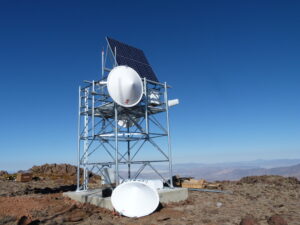Solar Powered Microwave RF Repeaters support Right-of-Way Communications Projects
 Peninsula Engineering Solutions’ Microwave Radio Frequency (RF) Repeaters are designed to transfer telecom signals from one radio terminal to another without loss of quality, data, or traffic. The range of frequencies supported is from 6 to 11 GHz. The most popular telecom bands used are 6, 7 and 8 GHz.
Peninsula Engineering Solutions’ Microwave Radio Frequency (RF) Repeaters are designed to transfer telecom signals from one radio terminal to another without loss of quality, data, or traffic. The range of frequencies supported is from 6 to 11 GHz. The most popular telecom bands used are 6, 7 and 8 GHz.
These point-to-point microwave RF repeaters are designed to be compatible with microwave radios from leading manufacturers worldwide. The repeaters can operate in frequency division duplex (FDD) digital radio networks with traffic capacities from 2 Mb/s to 700 Mb/s per radio carrier. The repeaters can be configured from simple duplex to N+0, N+1 multi-line arrangements and XPIC ACAP configurations. Frequency, space, and hybrid diversity are supported. The spartan design of RF repeaters minimizes equipment latency to typically 100 nanoseconds making them ideal for transaction sensitive data network applications.
The simplicity of these RF repeaters makes them ultra-reliable and very power efficient. These repeaters are most often powered by photovoltaic solar renewable energy sources. This power efficient capability makes this equipment ideal for remote, unattended radio relay sites along right-of-ways such as pipelines, water canals, electric power transmission, railways and the like. Microwave RF repeaters are in service worldwide supporting telecommunications system operators by providing through repeater sites on mountaintops and other remote locations.
Pipeline communications projects are well suited for Peninsula’s RF repeaters in that long distances must be spanned, distances between pumping stations are normally greater than one or two microwave hops, site power must be locally generated and telecom circuit access is normally not required at sites between pumping or major stations. While site electric power is expected at pumping stations, the telecom only sites, in between the pumping stations and terminals, typically only have power for the telecom equipment.
Solar Power Optimized
A standard duplex RF repeater has a power consumption of about 50 Watts. Even the 1+1 frequency diversity and 2+0 duplex RF repeater configurations are power conservative at 100 Watts for the entire site. Generating such modest amounts of electric power from solar arrays and batteries is perfect for an unattended repeater site.
Peninsula uses a redundant solar electric battery system approach where two identical solar arrays, charge controllers and storage batteries are installed. The microwave RF repeater load is designed to draw power from either battery and also to balance the DC load during normal operation. Should there be a failure in one solar power system, the entire site can operate from the remaining array and battery for a few days thus providing time to make repairs. Sites are typically designed for 10 to 14 days of battery operation without sunshine. The actual conditions at the site will modify the backup time as required.
A sophisticated alternative power approach is to use a hybrid combination of photovoltaic solar array and fuel cell electric generator for additional reliability during extended periods of inclement weather. Hybrid power systems can reduce the size of the solar arrays substantially in higher latitude locations.
Outdoor Mounting
Peninsula’s microwave RF repeaters and site power equipment are built for outdoor installation without shelters. This characteristic can further simplify the radio relay site and reduce costs. All site equipment is frequently mounted on the tower. The only times shelters are used are for maintenance staff protection, larger battery plants or additional security.
Long Distances
When the distance between major stations is substantial, i.e., more than 100 km, tandem RF repeaters may be used. Radio systems with two, three and even four RF repeaters in tandem have been designed and installed. Peninsula has design tools to support tandem repeaters up to five hops. A two hop, single repeater version of the design tool is available free from Peninsula on request. Peninsula transmission engineers can assist in path calculations and project engineering.
Peninsula Engineering Solutions and its predecessor companies have more than forty years of field experience in solar powered microwave repeater sites. Sites are operational on all continents except Antarctica. Major use areas include North America, South America, Middle East, China, and Africa. This experience is vital in engineering reliable radio relay systems from both radio transmission and reliable site power perspectives.
Adding to the superb reliability is an Alarm Supervisory System that is purpose designed for microwave RF repeater sites. Alarms and telemetry are sent to neighboring microwave radio sites where they can be integrated into system wide network management systems.
